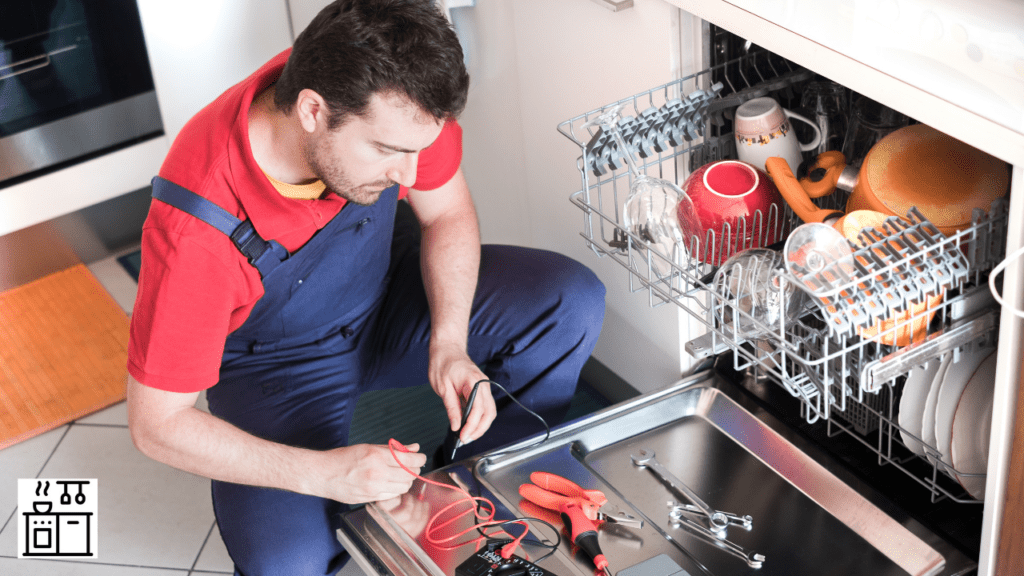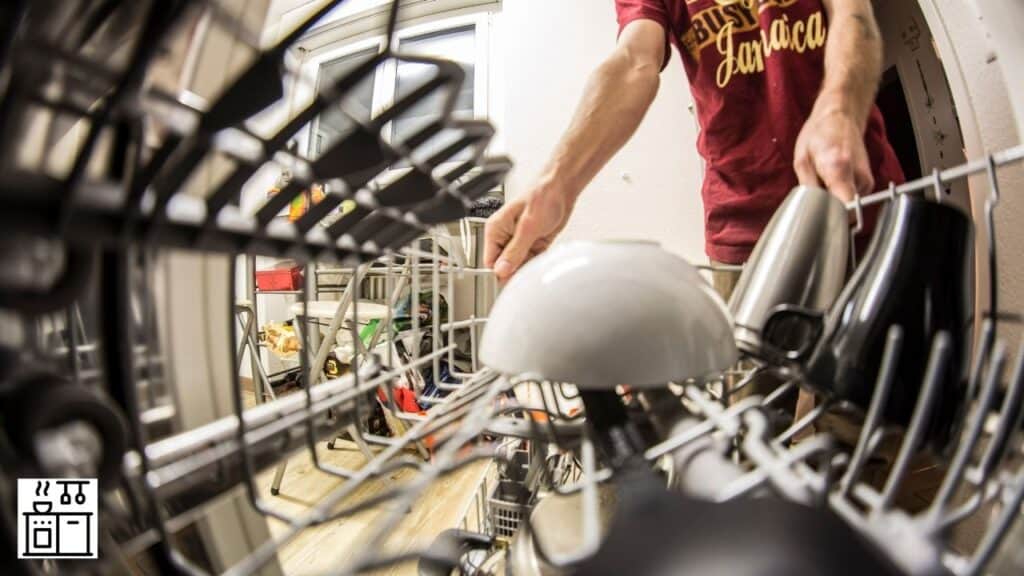Dishwashers have become an indispensable part of our everyday lives. They’re easy to use, convenient, and save on water bills. But, can dishwashers catch fire?
Yes, dishwashers can catch fire. They’re one of the common non-cooking appliances involved in fire incidents. This is because dishwashers primarily use electronic boards, electrical wiring, heating elements, and water for operating. All of these together can be a recipe for a serious fire hazard.
If you’d like to learn more about how dishwashers can cause house fires and how to prevent them, keep reading.
What Are The Components Of A Dishwasher?
To better understand the fire hazards caused by dishwashers, it’s essential to know what they’re made of and what causes the risk.
Here’s a quick rundown of dishwasher components and their location:
- Heating element – almost always at the bottom.
- Detergent dispenser – usually in the door.
- Control pad – on top.
- Racks – within the dishwasher.
- Silverware basket – on one of the racks, usually the bottom rack.
- Spray arms – they rotate underneath the racks.
- Door latch – seals the door.
- Water inlet valve – near the heating element at the bottom.
- Circulation pump/motor – at the bottom.
- Filtration system – at the bottom.
As you can see, dishwashers are a fire hazard simply because they combine electrical elements with water in close proximity.
Let’s go into detail about what that means and how you can be on top of the situation.
Why Do Dishwashers Catch Fire?
There are many reasons dishwashers catch on fire. Given below are some of them.
1. Faulty Wiring
Many fire incidents involving dishwashers happen due to design or manufacturing errors.
Faulty wiring is a lead example, where the electrical wires running at the bottom of the machine cause short circuits.
In a famous 2007 incident, Consumer Reports reported that GE issued a recall on 2.5 million units sold within that year.
Until now, this is the largest known recall of that kind.
A more recent recall happened in June 2021, where Cove recalled 42,000 dishwashers.
These units were sold with a fault that made them fail to shut off, causing overheating.
Many people reported the smell of burned plastic coming from their units.
2. Worn-Out Electrical Cords

Running a dishwasher with a worn-out cord can be a very serious hazard should some of the insulation come off.
Aside from the obvious danger of electrocution, a frayed cord can send sparks to nearby flammable material, causing a house fire that can’t be controlled in time.
If the dishwasher has a frayed electrical cord, you should get it professionally replaced.
Don’t try to DIY this if you don’t have prior knowledge of the electrical parts because using the wrong wire can potentially be even more dangerous.
Recommended Further Reading: Why Dishwashers Take So Long? | Is A Dishwasher Water-Efficient? | Is A Dishwasher Worth It? | All Dishwashers Are Of The Same Size?
3. Poor Maintenance
Regular maintenance is incredibly important for dishwasher safety, and it helps you get the best results out of your dishwasher.
Cleaning the filter using vinegar and baking soda or a commercial cleaner can get rid of the grease and food bits stuck inside the filter, reducing the chance of them catching on fire during dry heated cycles.
You should do this at least once a month.
It’s also crucial to fix any leak as soon as it happens.
Water that seeps out of a dishwasher can cause an electric fire if it reaches the wiring in the dishwasher or any other neighboring device.
We advise you to do a full checkup on your dishwasher at least once a year.
That way, you can catch any problem before it becomes a serious safety hazard.
4. Incorrect Use
You might have heard that you should never overload your dishwasher, and it’s for a good reason.
It simply won’t give you good results, and you might need to rerun the cycle to clean your cookware and dishes properly.
This can cause overheating since the heating element will run overtime without a long-enough rest period between loads.
Running the electrical cord under carpeting is also not advisable as this can wear out the cord and break it down faster.
And since carpeting is usually flammable, it can lead to a fire.
You should also never use an extension cord as a permanent connection.
It’s much safer to plug the dishwasher into a grounded wall socket.
Also, check to make sure the outlet matches the electrical load of your dishwasher to avoid discrepancies.
5. Dishwasher Running Unattended
Raise your hand if you ever turned on the dishwasher right before you went to bed or realized you forgot to get something from the store in the middle of a cycle and left the house while the dishwasher was still running.
This might seem like harmless behavior, but the truth is many dishwasher fires happen in similar circumstances.
Not being around when the dishwasher malfunctions and starts overheating will cause more severe damage to your home before you can do something about it.
Therefore, you should never leave any electric appliance—be it a washing machine, dryer, or dishwasher—running overnight or when you’re away.
And make sure there are no pets or small children allowed near the running appliance.
What Can You Do to Prevent Dishwasher Fires?
Given below are some precautionary tips that will help make your dishwasher less of a fire hazard.
1. Know Your Dishwasher
It’s always important to be aware of the ins and outs of your machine.
That said, make yourself acquainted with the instructions manual.
This could be an inane task, but the manufacturer usually offers important information there pertaining to safety and proper use.
It’s also a good move to register your dishwasher on the manufacturer’s website.
Sometimes recalls are issued.
So if you register your dishwasher and your model or serial number is recalled, you’ll be notified by the company.
2. Use The Dishwasher Responsibly
As stated earlier, there are some things you need to consider while operating your dishwasher.
Leaving your dishwasher running all night while you’re in bed or not being around while it’s on can seriously delay your response if an emergency happens.
You should also make sure the electric socket that the dishwasher is plugged into is well-suited for its wattage.
Otherwise, this can put you in danger of damaging other devices if a short circuit occurs.
Last but not least, always check if any plastic parts are worn out, causing leaks or other hiccups during operation.
A usual culprit is the detergent dispenser in the door, which can cause water to reach important wiring inside the door.
3. Seek Professional Help
Always call a professional if you notice something out of the ordinary with your dishwasher.
If it beeps or shakes when it’s not supposed to, there’s a chance it’s not functioning properly and might be a safety hazard.
Interesting Further Reading: Is A Bosch Dishwashers Good? | Is A Dishwasher Hardwired? | Can Dishwasher Pods Go Bad? | Why Are Dishwashers So Expensive? | How Long Do Kitchenaid Dishwashers Last?
What To Do In Case Of A Dishwasher Fire?
Never use water on an electric fire, as you’ll run a very high risk of electrocuting yourself, and it won’t really extinguish it.
It might actually spread the sparks to nearby flammable material.
Instead, you should use a class C fire extinguisher that’s suited for electric fires.
If the fire is small and can be contained, you can pour baking soda on it or smother it with a heavy blanket.
If possible, unplug the device before evacuating the building and call emergency services immediately.

